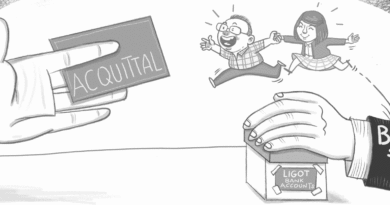Germany accuses Vietnam of abducting businessman from Berlin
In broad daylight, witnessed by joggers and dog walkers, a former oil executive is plucked from a central Berlin park by armed men and bundled into the back of a car. Days later he appears on state television in his native Vietnam confessing he had in fact chosen to come home in order to face justice for his wrongdoings.
The story could well be the plot of a cold war thriller. Except that the German government has said it has “no doubt” that Trinh Xuan Thanh, 51, was abducted by intelligence agents just a few days ago. They have demanded an explanation from the Vietnamese government in Hanoi for the brazen act, as well as summoning its ambassador to the foreign ministry in Berlin and expelling its spy chief, who has been labelled persona non grata.
“We no longer have any doubt that Vietnam was involved in his abduction,” Martin Schäfer, a spokesman for Germany’s foreign ministry said, adding that the incident amounted to “an extreme breach of trust”.
Trinh Xuan Thanh, a former manager and communist party functionary, was apparently enjoying a summer walk through Berlin’s Tiergarten park close to his hotel at about 10.40 on 24 July, accompanied by a female employee of Vietnam’s foreign trade delegation in Berlin. Witnesses, who called the police, said the couple was approached by a dark limousine out of which several armed men sprang. They pushed the couple into the car and sped off through the park.
According to several sources, the car had a Czech number plate. German government sources said the couple were driven into an eastern European country, likely to have been the Czech Republic. Trinh is believed to have been flown back from there to Hanoi on a Vietnamese plane. The woman was brought to hospital in Hanoi two days after the abduction where she was treated for an arm injury. Trinh’s whereabouts were not revealed until a week later, on 31 July, when Vietnam’s state press reported he had presented himself to authorities to face charges relating to embezzlement.
Trinh was a well-known executive in Vietnam and rose to be an official at PetroVietnam, the state oil company. In May last year he was elected to parliament. His downfall came several weeks later, when the head of the communist party, Nguyen Phu Trong, ordered an inspection of the accounts of PetroVietnam and announced that 3.3bn dong (£110m) were missing from the company. He was condemned by communist authorities for failing to live modestly after he was found to be in possession of a luxury Lexus car with government number plates.
Following the accountancy revelations, four company employees were arrested. Trinh, who as an MP had a diplomatic pass, fled via Laos, Thailand and Turkey to Germany, where he applied for asylum 10 months ago. He has been called Vietnam’s most wanted man.
According to Schäfer, Vietnam’s wish to have him extradited formed the backbone of lively discussions on the sidelines of last month’s G20 summit in Hamburg, “high-ranking German government officials spoke with their Vietnamese counterparts about possible ways in which a lawful extradition could take place”, he said. It is believed that Angela Merkel spoke to Prime Minister Nguyen Xuan Phuc on the issue.
Trinh’s lawyer, Victor Pfaff, said he first believed something was wrong when Trinh failed to turn up for a hearing for his asylum request, scheduled the day after his abduction.
“It was completely not like him to come, so I knew at once that something had happened,” Pfaff told German media.
The first sighting of Trinh was on state television on Monday, when he was shown looking tired and anxious, with tousled hair, dressed in a red T-shirt. In a message broadcast on a primetime news bulletin, he said he had decided to turn himself in.
“I wasn’t thinking in a mature way,” he said, “and decided to hide away, but during that time I came to the realisation I had to return to face the truth and admit to my mistakes and to apologise.”
He said “out of fear” he had decided to flee to Germany, where he had lived, he said, “a precarious and anxious life”. He said his family had supported his decision to hand himself in.
But another of his lawyers, Petra Isabel Schlagenhauf who is working on the case with Pfaff, said she cannot imagine that Trinh would have handed himself over to the authorities. “Under no circumstance would he have voluntarily handed himself over to the Vietnamese authorities,” she said in a statement. “He is aware that for political reasons he cannot expect a proper trial”.
In December communist party chief Nguyen Phu Trong told state media: “We are determined to capture Trinh. He cannot hide forever.”
German media, who have compared the kidnapping to the numerous Soviet abductions that took place under communism, expressed their shock at the contrast between the pictures of Trinh on television and those taken of him by German papers last autumn, when he was shown sitting on a park bench in a smart woollen coat talking about his hopes of being able to work as a businessman. It is believed his wife and two children are still in Berlin.
The foreign ministry said it had made it “unmistakeably clear” in its discussions with Vietnam’s ambassador to Berlin that Trinh had to be “immediately” returned to Germany so that Vietnam’s extradition application as well as Trinh’s asylum application could be scrutinised according to the law.
German officials have said that the abduction move is particularly risky for Vietnam because it could have a lasting effect on relations between the two countries. Berlin has not ruled out taking other measures against Hanoi.
Vietnam has a generally positive image in the west, as both a tourist destination and a trade partner, but human rights organisations stress it remains a police state. According to Amnesty International it had 91 political prisoners in 2016. One of the most prominent dissidents of recent years, the human rights lawyer Le Quoc Quan was imprisoned for 30 months on the grounds of tax evasion.









